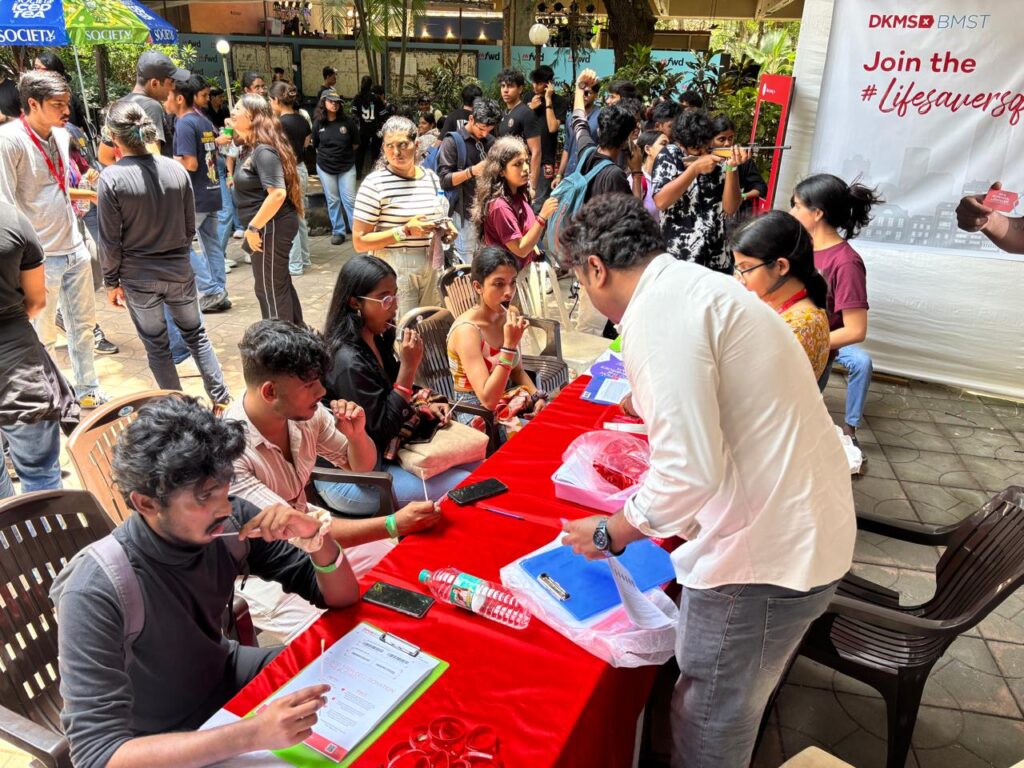DKMS-BMST Joins St. Xavier’s College Mumbai Fest to Spread Awareness About Stem Cell Donation
 Mumbai, August 21, 2024: DKMS-BMST, a leading non-profit organisation dedicated to fighting blood cancer and other blood disorders, participated in Malhar 24, the prestigious cultural and social fest hosted by St. Xavier’s College, Mumbai. From August 15th to 17th, DKMS-BMST engaged with the vibrant student community to create awareness about life-saving stem cell donation.
Mumbai, August 21, 2024: DKMS-BMST, a leading non-profit organisation dedicated to fighting blood cancer and other blood disorders, participated in Malhar 24, the prestigious cultural and social fest hosted by St. Xavier’s College, Mumbai. From August 15th to 17th, DKMS-BMST engaged with the vibrant student community to create awareness about life-saving stem cell donation.
The three-day event provided a platform for DKMS-BMST to educate students about the importance of stem cell donation and dispel myths surrounding the process. Through interactive stalls, informative sessions, and engaging activities, the organisation aims to inspire young people to become potential lifesavers.
During the event DKMS-BMST had set up a booth at the cultural fest, where students and attendees learn more about blood stem cell donation, the registration process, and how they can potentially save a life. Malhar hosted annually by St. Xavier’s College students, first began in 1979. The festival includes events cultural contests in literary, performing arts, and fine arts categories, along with several workshops on different themes.
“We are excited to partner with Malhar and connect with the dynamic youth of Mumbai,” said Patrick Paul, CEO, DKMS BMST Foundation India. “Young individuals are the future of our nation, and their enthusiasm and compassion can make a significant difference in the lives of those battling blood cancer. By joining hands with St. Xavier’s College, we hope to encourage more people to register as stem cell donors and contribute to building a healthier society.”
Celine Moonjely from the organizing team at St. Xavier’s College expressed their enthusiasm for the collaboration, stating, “We felt proud to host DKMS India at Malhar. This initiative aligns perfectly with our college’s commitment to social responsibility. We believe that by educating our students about stem cell donation, we can empower them to positively impact the world. We are happy that 135 students registered as potential stem cell donors.”
Every 5 minutes, someone in India is diagnosed with blood cancer or a blood disorder like Thalassemia or Aplastic Anemia. Many such patients are children and young people whose only chance of recovery is a stem cell transplant. For a successful stem cell transplant, the patient needs to find an HLA (Human Leukocyte Antigen) matched donor. Most often, the majority of the patients are unable to receive a transplant due to the unavailability of a matching blood stem cell donor. With very few individuals signing up as potential blood stem cell donors, finding a matching donor is difficult. This increases the need for more people of Indian ethnicity to register themselves since finding a matching donor can be difficult, as there is only a 1-in-a-million chance of a patient finding a match on the registry.
The partnership between DKMS and St. Xavier’s College is a significant step forward in raising awareness about blood stem cell donation in India. By working together, the two organizations can reach out to a large number of young people and educate them about the importance of registering as potential donors.
To register as a potential stem cell donor, you must be a healthy Indian adult between 18 and 55 years of age. When you are ready to register, all you need to do is complete a consent form and swab the inside of your cheeks to collect your tissue cells. Your tissue sample is then sent to the lab to be analyzed and listed anonymously on the international search platform for matching stem cell donors. If you’re eligible, take the first step to register as a blood stem cell donor by ordering your home swab kit at www.dkms-bmst.org/register
So far, DKMS-BMST India has registered over 1,30,000 stem cell donors in the country and facilitated 130 transplants since its inception in 2019, significantly impacting the fight against blood cancer. The organisation aims to register more donors in India to give a second chance at life to as many patients as possible.
